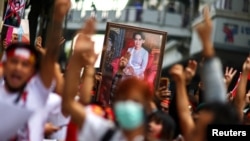Myanmar’s military lacks a strategic plan to end the conflict in the country and move the nation forward regionally and globally on a diplomatic level. That’s what experts are saying after Myanmar’s military leadership, officially the State Administrative Council, met Monday with senior Thai officials in Thailand.
Myanmar Foreign Minister Than Swe reportedly attended the meeting, which is taking place over two days in Pattaya, a holiday resort 60 miles from Bangkok.
Thai Foreign Minister Don Pramudwinai said the crisis in Myanmar is sending refugees across the Thai-Myanmar border, and trade between the two countries has been damaged. Brunei, Cambodia, China, India, Laos and Vietnam reportedly are attending the meeting as well.
David Scott Mathieson, a Myanmar analyst, says the military has no long-term blueprint.
“There is no way out internationally; the time for a post-coup exit plan was early in 2021 after the ASEAN plan, and they totally missed that opportunity. They're simply making up their strategy day to day, which means you have no chance of a coherent diplomatic plan. [They’re] just reactive, that’s all [General] Min Aung Hlaing can do,” he told VOA.
ASEAN discontent
The meeting was unexpected because Myanmar’s leaders have been barred from participation in major gatherings of the 10-member ASEAN regional grouping. Some ASEAN members — including current chair Indonesia, Malaysia, and Singapore — declined to attend the Pattaya sessions.
Aung Thu Nyein, a Myanmar analyst, said the meeting has irked multiple ASEAN members.
“Many ASEAN countries assume Thailand is a front-line country with Myanmar, and it can initiate some policies because of its significance. But for this meeting, many ASEAN members opposed [it] and say it seemed [to cross] the line of the organizational agreement,” he told VOA.
Myanmar’s shadow government, the National Unity Government, said the talks won’t stop the crisis, and more than 80 Myanmar activist groups condemned the meeting.
So far, international organizations have been unable to find a diplomatic solution in Myanmar.
The U.N. special envoy to Myanmar, Dr. Noeleen Heyzer, left her role last week after her contract ended on June 12 after 20 months in the role without achieving a diplomatic breakthrough.
“I can't see any diplomatic progress [from] the military leadership. Until the [State Administrative Council] actually wants some genuine outside help, all these efforts are performative, empty of any substance, and actually serve to confuse some observers who think there is merit in reaching out,” Mathieson said.
Thomas Kean, senior consultant at the International Crisis Group and editor-at-large of Frontier Myanmar, shared Mathieson’s view about the junta’s lack of an exit plan.
“The election was the regime's exit strategy from day one, and it doesn't appear to have a backup plan. The current state of emergency will expire at the end of July. It's not clear what the military will do, but certainly it hasn't made much progress since then in quelling unrest, and there are no signs of preparations for an election,” Kean said.
State of emergency
Myanmar’s ruling generals promised new elections after their February 2021 coup but, faced with widespread resistance to their rule, have repeatedly extended a state of emergency, with the latest extension set to expire on August 1.
Reports also emerged last week that the junta had visited jailed democracy leader Aung San Suu Kyi to discuss a peace deal. But military general spokesman Zaw Min Thu denied this to VOA Burmese.
Suu Kyi, who turned 78 on Monday, is serving a combination of prison sentences totaling 33 years after being convicted on several charges by a military-run court.
Pro-democracy activist Thinzar Shunlei Yu said it makes no difference whether the reported visit happened.
“If the negotiation ever happened that [would be] merely a dialogue between [Aung San Suu Kyi] and her party. That won't represent the whole revolution or the key stakeholders of the resistance,” she told VOA.
Myanmar’s military has upped its airstrikes against resistance forces in the last year and some commentators see that as an indication the military is struggling on the battlefield.
“That change came midway through last year, when the Burma army [leaders] were starting to feel they weren’t winning this war. The shift went from bombing military targets, resistance camps, roads, vehicles, to clinics, schools,” Dave Eubank, founder of the Free Burma Rangers, a Christian, multi-ethnic humanitarian group, told VOA earlier this year.
In the deadliest airstrike since the coup, the military killed at least 168 people in April, including dozens of children, in the Sagaing region in northwest Myanmar.
Kean said the airstrikes are part of the junta’s brutal combat tactics.
“This shouldn't necessarily be seen as a sign of weakness or that it is on its last legs, as some have argued. Brutal counterinsurgency tactics have long been part of its modus operandi, and it has only acquired this aerial capacity relatively recently."
Following the coup, the military has cracked down on nationwide resistance, killing thousands and jailing political leaders, which has fueled an armed resistance led by people’s defense forces and ethnic armed organizations.
According to a Thailand-based monitoring group, the Assistance Association for Political Prisoners in Burma, 3,672 people have been killed by the military since the coup.
